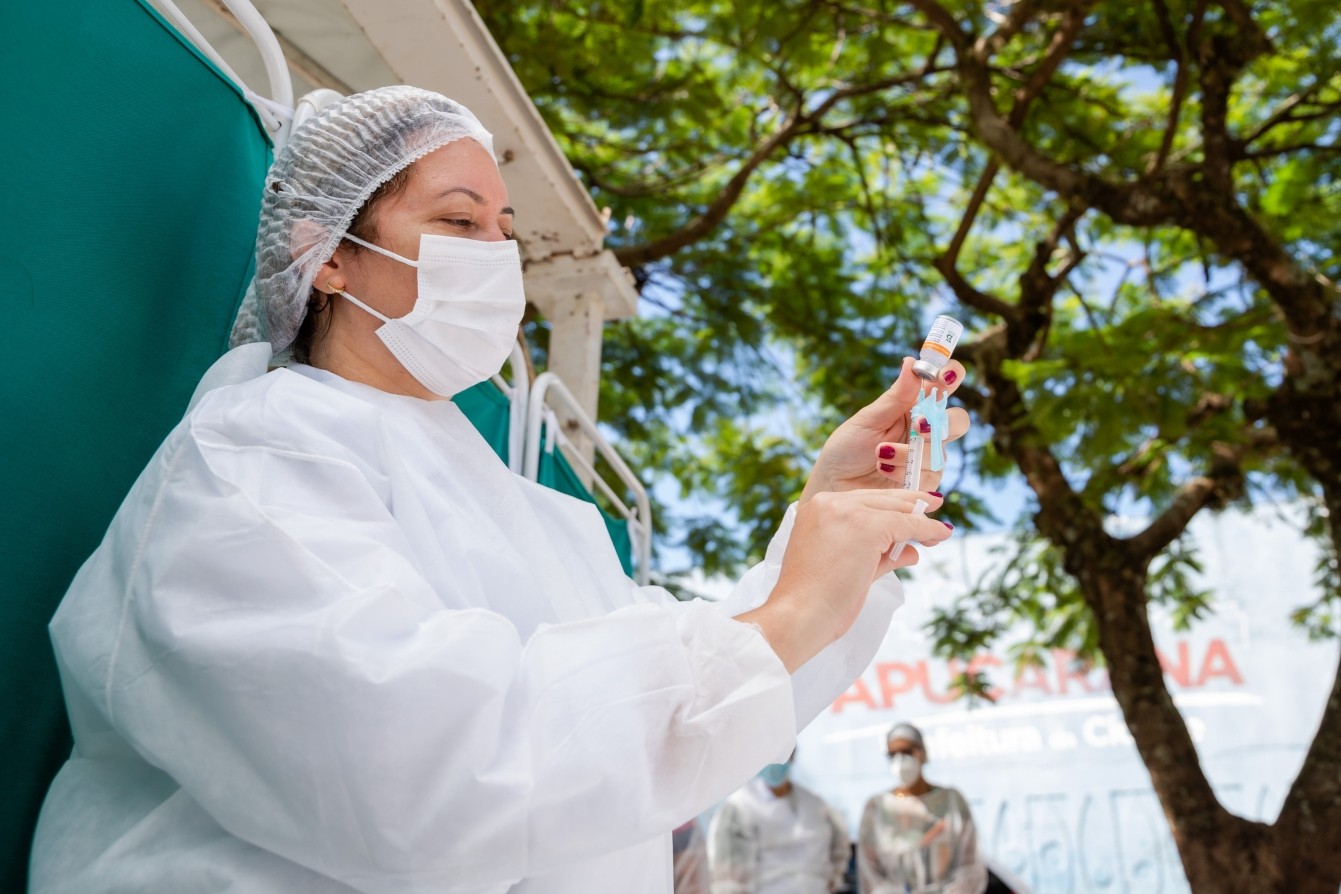Qual exame fazer após a vacina da covid? Confira as orientações
Micheli Pecharki | 16 mar 2022

Desde que as vacinas começaram a ser aplicadas na população, uma dúvida tem se tornado frequente entre as pessoas que estão sendo imunizadas e também entre os profissionais que orientam a população em relação à imunização. Afinal, é necessário ou não fazer um exame para avaliar se a vacinação induziu a produção de anticorpos? Algum exame é indicado?
Várias instituições e sociedades médicas já se posicionaram sobre o tema. A Anvisa (Agência Nacional de Vigilância Sanitária), a Associação Médica Brasileira (ABM) e a Sociedade Brasileira de Imunizações publicaram notas explicando os motivos pelos quais os exames pós-vacinação não são recomendados. Confira as principais orientações no artigo a seguir.
Afinal, preciso fazer o teste sorológico para verificar a resposta à vacina da COVID-19?
Segundo a SBIm, os testes sorológicos, não são recomendados para esse fim porque não permitem uma conclusão isenta de erros sobre a resposta à vacina, o que pode ocorrer por alguns motivos:
- Não sabemos o nível de anticorpos necessários
Não se sabe o nível de anticorpos necessários para prevenir a COVID-19, portanto o resultado positivo (reagente) não significa necessariamente que a pessoa está protegida.
- O resultado pode ser um falso negativo
O resultado negativo (não reagente) pode refletir a baixa sensibilidade do exame (falso negativo). Isso significa que, pessoas protegidas pela vacina podem testar negativo no exame.
- Não é possível diferenciar se o resultado positivo é decorrente da vacinação ou infecção prévia
As vacinas contra COVID-19 têm como alvo a produção de anticorpos contra a proteína S do SARS-CoV-2. Essa proteína é responsável pela ligação com nossas células e a consequente infecção. São esses os anticorpos que seriam os marcadores de proteção a serem investigados.
Em relação aos testes para COVID-19 atuais, estes podem verificar tanto o nível dos anticorpos contra a proteína S, quanto os anticorpos contra a proteína do nucleocapsídeo do vírus (N). Uma vez que essa informação nem sempre está presente no laudo, isso pode gerar erros de interpretação.
A SBIm orienta também que, mesmo um resultado positivo (reagente) para anticorpos contra a proteína S, pode não ser possível avaliar se essa resposta do sistema imunológico foi induzida pela vacina ou se foi proveniente de uma infecção prévia pelo vírus.
Além disso, o processo de produção de anticorpos varia de pessoa para pessoa. Existem pessoas, por exemplo, que já foram diagnosticadas com COVID-19 mas apresentaram resultado negativo para o teste que detecta os anticorpos.
E o teste de anticorpos neutralizantes?
Os anticorpos neutralizantes são, como o próprio nome indica, os responsáveis por neutralizar os vírus que infectam um organismo. Existe um teste que detecta esses anticorpos, e que utiliza uma metodologia denominada ELISA. Embora esses exames indiquem a proporção de moléculas que podem neutralizar o vírus, não sabemos quanto tempo a ação desses anticorpos. Além disso, também não sabemos qual é o nível de anticorpos necessários para estarmos protegidos da COVID-19.
Se eu não preciso fazer exames após tomar a vacina, o que deve ser feito?
Segundo a SBIm, mesmo após a vacinação é necessário manter os cuidados que já conhecemos como usar máscaras que cubram o nariz e a boca, manter o distanciamento de outras pessoas e higienizar frequentemente as mãos. Isso porque, nenhuma vacina é 100% eficaz, embora elas sejam essenciais para evitar hospitalizações e mortes..
Após ter tomado a vacina, em quanto tempo ficarei imunizado?
O organismo precisa de um tempo para produzir os anticorpos. Segundo estimativas, esse tempo é atingido em cerca de duas semanas após a imunização. Para as duas vacinas disponíveis no Brasil hoje são necessárias duas doses.
É possível pegar COVID-19 mesmo vacinado?
Sim. Pessoas vacinadas ainda podem pegar COVID-19 e transmitir o vírus. No entanto, isso não quer dizer que as vacinas não funcionam. Elas são essenciais para evitar casos graves, mortes e hospitalizações.
Quais são os exames disponíveis para avaliar se uma pessoa está ou teve COVID-19?
Para avaliar se um indivíduo está com COVID-19, o mercado laboratorial oferece diferentes tipos de testes para COVID-19: o teste de antígeno (que detecta as proteínas do nucleocapsídeo viral), o RT-PCR e o RT-LAMP (que detectam o material genético do vírus). Já para avaliar infecção passada, o exame recomendado é o de sorologia, que detecta os anticorpos IgM e IgG.
Quando esses exames podem ser efeitos?
Cada exame deve ser realizado em um período adequado para diminuir as chances de o resultado ser um falso negativo.
Teste de antígeno
O teste de antígeno é indicado a partir do 1º até o 7º dia do início dos sintomas ou a partir do 5º dia da exposição ao vírus. Esse exame possui alta correlação com o período de maior transmissibilidade da doença.
RT-PCR ou RT-LAMP
Assim como o teste de antígeno, os exames que detectam o material genético do vírus são recomendados para a fase inicial da infecção. O exame RT-LAMP é recomendado do 3º ao 15º dia após a exposição ou do 1º ao 10º dia após o início dos sintomas. Já o RT-PCR é geralmente recomendado do 3º ao 10º dia do início dos sintomas.
Teste de sorologia (anticorpos)
O teste de sorologia detecta anticorpos IgM e IgG e por isso é indicado para avaliar exposição prévia ao vírus. Deve ser realizado a partir do 7º dia do início dos sintomas.
Referências bibliográficas
Sociedade Brasileira de Imunizações (SBIm). COVID-19. Perguntas e Respostas sobre as vacinas. Disponível em: <https://sbim.org.br/covid-19/1456-perguntas-e-respostas>. Acesso em: 26 de março de 2021. Boletim 05/2021
Realização de sorologia para avaliar a resposta imunológica às vacinas COVID-19. Disponível em: <https://amb.org.br/cem-covid/realizacao-de-sorologia-para-avaliar-a-resposta-imunologica-as-vacinas-covid-19/>. Acesso em: 16 de março de 2022.

Micheli Pecharki
Micheli é Bióloga. Acredita que transformar o conhecimento técnico em algo acessível é essencial para que as pessoas saibam como cuidar mais da própria saúde e vivam, assim, com mais qualidade de vida.

Deixe um comentário